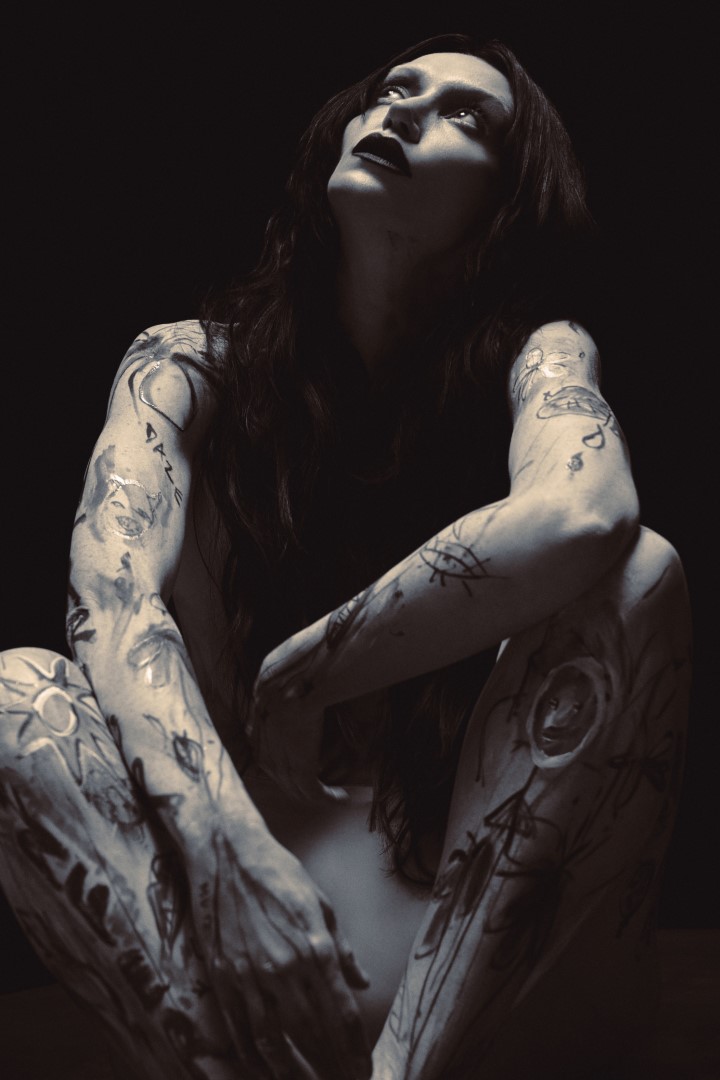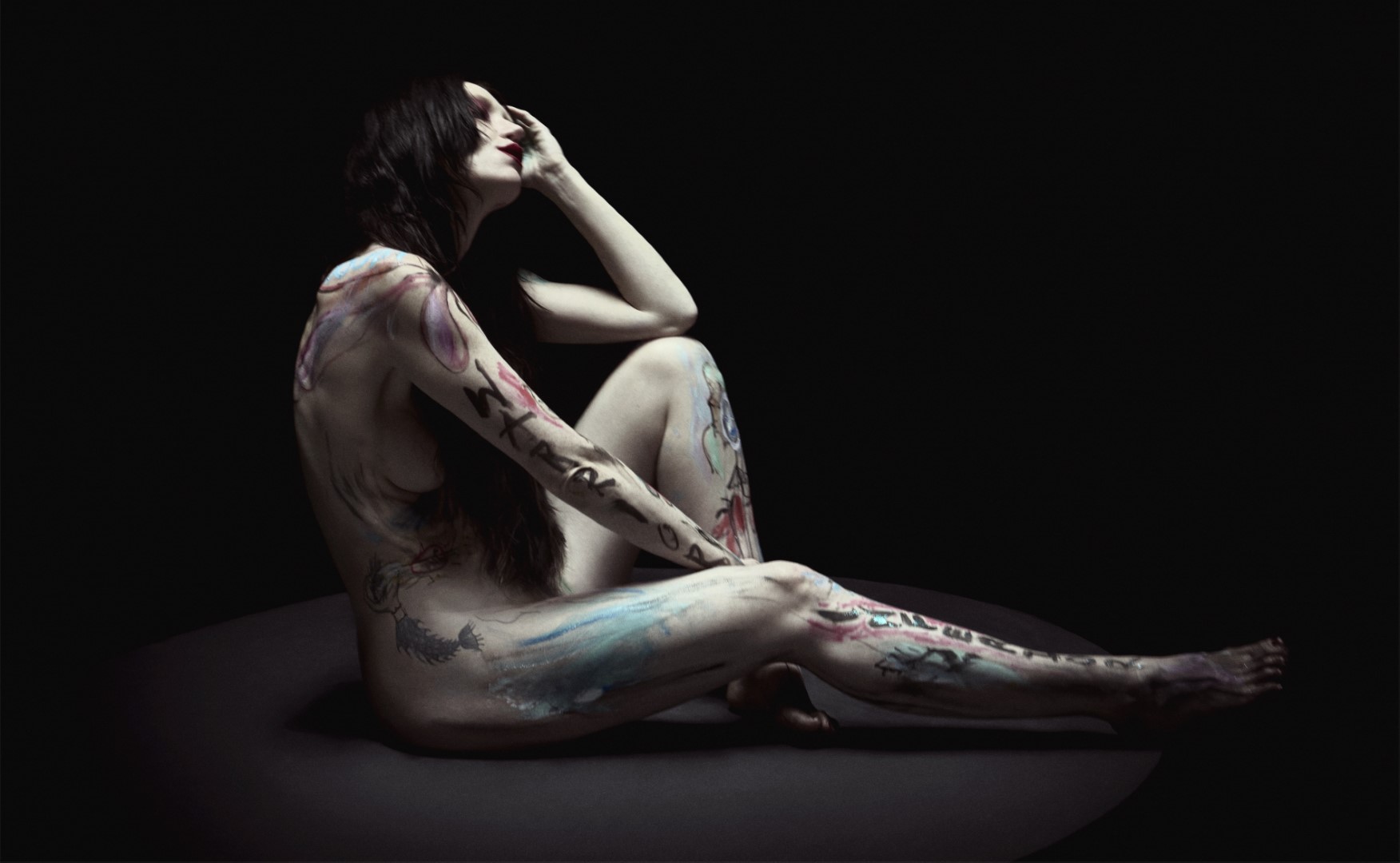Fi McCluskey

Fi McCluskey is an alt-rock musician who wants to shake people out of normalised narcissism. In a week where self-interest and fear drove 70-odd million people to vote an orange moron into one of the world’s most powerful governmental positions, her call to arms feels more timely than ever. Right at the start of her solo career, Fi McCluskey has come out guns blazing – not literally: take note, America – on issues ranging from our collective desensitization to the ongoing acts of genocide in Palestine and Ukraine, to the lack of maternal support in the UK, to influencers who affect our perception of art and unwittingly encourage a toxic form of hyper-individualism.
Her latest single, ‘Die Young’, is an invitation to re-examine an entrenched, archaic perspective on post-natal depression. In the same vein, her outspoken approach to interviews suggests her next release, ‘Scream’, will be another provocative piece of what McCluskey herself describes as ‘sonic activism’.
We caught up with Fi McCluskey to discuss art’s power to open a dialogue where social media only tends to open echo chambers, how we can – and why we must – reject the normalisation of atrocities, and the scenario in which she might be reincarnated as a goat herder…
FAULT: Reading some of your previous interviews, you obviously don’t have a lot of time for grey areas. You’ve taken pot shots at the Tories’ debilitating mishandling of the NHS; you’ve openly called out the Daily Mail, and the right-wing media at large, for being riddled with misinformation – and implied strongly that the reason for that is to entrench ignorance and/or social stigmas. You’ve stated outright that men, in general, don’t have the same empathy levels as women because they haven’t experienced the same degrees of vulnerability as women. Social media, you argue, is little more than “narcissistic pornography”.
For the record, I agree with most, if not all, of that but isn’t there a risk that you come across as pretty exclusionary? In the sense that someone could read the above and think, “Shit, I’m male/I’ve voted Conservative/I read the DM or ‘red tops’/I use social media regularly: maybe this music isn’t for me?” And, if that’s the case, how can you really hope to move the needle on the important social issues you want to discuss?
Fi McCluskey: Firstly, may I take this opportunity to thank you on your sterling research. I don’t agree with you on the black and white as all we have are shades of grey. By highlighting said groups, in my opinion, I feel I’m challenging their views rather than excluding them. If anything, it’s about engaging and initiating conversation.
One must always strive to look at the bigger picture. Music and politics have had an undoubtable relationship throughout history. The lesson we can take from this is that we’re stronger together. There’s power in numbers!
Instead of focusing on the risk of being exclusionary, let’s instead look at the benefits of uniting individuals and forging transversal alliances across boundaries. Let’s create a louder, stronger voice that spans many mediums and communities. Just take Hip-Hop, Punk and Rock ‘N’ Roll, for example. These movements had a huge impact on the landscape and narrative. This is how I hope to move the needle, as this is considerably larger than one individual.
You’re quick to condemn what you describe as a burgeoning trend towards hyper-individualism, one which leads inevitably towards a false ideal of extreme self-sufficiency where vulnerable individuals – and entire groups – become marginalised (at best) or maligned (at worst). Those who don’t fit into the ‘happy Hallmark’ profile – the glowing pregnant woman or the doting mother, for example – are shunned for being inconvenient, often at times when they need help the most. What, in your opinion, needs to happen (even while horrors persist in Ukraine and Palestine) to shake people out of their complacent narcissism enough to give a shit?
I feel that this way of organizing ourselves hasn’t bought us happiness. In my opinion, this is no way to go through life – only noticing or caring about a situation when it impacts you directly. The consequences of this continuous stream of bravado, and smoke and mirrors, not only breeds a false ideal of extreme self-sufficiency but has also normalized and found ways to monetize solutions to help you sustain an unsustainable lie. That’s extremely toxic.
We find ourselves living in a time where people are streaming their genocide live on social media. For a huge number of people, even that hasn’t managed to shake them out of the narcissistic behaviour they exhibit while using the very same platforms. That is a very sad state of the modern human condition and we must ask ourselves why it’s come to pass.
Never in history have we witnessed, in real time, something of this magnitude unfolding in front of our eyes. These horrors, once posted, are living next to images shared by ‘influencers’ preparing an avocado-on-toast, for example. One could argue that anyone over the age of 25 who continues to post this kind of imagery, especially at this moment in time, is completely, socially tone deaf.
The consequence of this sort of behaviour lends itself to the innate human mechanism ‘to normalise’. This is serious and needs addressing.
I remain in utter disbelief at the continued silence from all of the bigwigs of today. There is one thing for certain: we cannot look away.
Whilst people are becoming increasingly disengaged, it is essential to stay in contact with those who are present and to initiate action, with the hope that the ripple-effect will wake people up.
Engage the masses, even the ‘influencers’, and shake people out of this human condition to normalise. Especially where the atrocities of Palestine and the Ukraine are concerned.

As a recent father, I’ve witnessed at close quarters the UK’s deficiencies at dealing with pregnancy and maternity. In particular, London and its inhabitants both seem to excel when it comes to expressing disdain for anything related to motherhood: whether that’s the audible groans of commuters confronted by someone trying to lug a pram around woefully inaccessible public transport or the unwanted and unprompted judgement quite literally spat out and into the faces of pregnant women and recent mothers.
By contrast, other countries in Europe (for example) seem to welcome new mothers and children: they take an interest, offer to help, and cities/towns have dedicated spaces set up for pregnant/breastfeeding women and/or young children. Any idea why that might be the case?
In my opinion this is both structural and cultural. For starters, there is not a sufficient amount of help available to new mothers in the UK. There is help out there, however this help is not accessible to all. Add to that the British stiff upper lip narrative of “well, we just had to get on with it: you’ll figure it out”.
We still have a lot of dated ideologies where parenthood is concerned. This inevitably leaves a lot of new mothers feeling extremely isolated. I do hold hyper-individualism accountable to some degree, as this way of thinking seems to be celebrated and rewarded in today’s society.
I am promoting the message of empathy. It goes such a long way and, at the very least, it’s a good place to start. We can most certainly take a leaf out of countries’ books, such as Spain, where new mothers are concerned.
Previously, you’ve claimed that artists don’t need to prove themselves. Why not? Shouldn’t art and ideas be meritocratic?
Art is subjective and can speak for itself.
When referring to meritocracy, in an ideal world, this would be across the board and in all aspects of life from art to further education and society as a whole.
The point you are referring to has been taken slightly out of context. This was part of a larger statement, drawing on a specific comparison between our new-found obsession, and the normalisation, of sharing all aspects of our lives. Let’s call it ‘the avocado-on-toast effect’. Artists are being strong-armed into sharing their entire process – this feels invasive. One can contextualize their work, but let’s keep some mystery and transportive magic.
The question is, would you attend every rehearsal before seeing the final show?
How did your upbringing influence your socio-political ideology and/or approach to music?
My parents are both from Dublin, they moved to London in the late ’60s and have always been extremely honest and open, with both my sister and I, about the obstacles they faced when they first immigrated. We were educated by them, not shielded from the truth. For that, I am extremely grateful.
They would tell us stories of a time where signs in the windows of certain shops, and flats to rent, would read ‘No Blacks, No Dogs, No Irish’. It was instilled in us that there is no entitlement, that you cannot take your liberties for granted and that those liberties are fragile.
My Irish heritage has played a huge part in my approach to my work. From the poetry to the punk spirit, I have always felt a deep connection to my heritage.
Growing up in Romford and Dagenham, it was real. My eyes have always been open – covered in fake tan from time to time, but always open. I intend to keep them that way.
Never stop learning…
You’re right at the start of your musical career but do you see yourself having or developing a clearly identifiable sound or style? Or is the idea to be as fluid as possible?
This is not my first rodeo but the beginning of my solo venture. At this moment in time, I feel I am developing a sound which is clearly identifiable. It is taking shape. The beauty is that this is happening organically, I just love a heavy bassline…
It has its own personality; it is most definitely part of the same tapestry. This will, like all things, evolve and change.
Who would you most like to collaborate with and why?
Patti Smith, Patti Smith, Patti Smith when you say it three times it might come true.
If you have to ask why, I’m afraid I can’t help you….

If you weren’t making music, what would you be doing?
If I wasn’t making music, I’d probably be living on a mountain somewhere, with a goat, a bell, and one pair of beautiful handmade boots for me to admire, not necessarily in that order.
Who is overrated/underrated?
In today’s society:
Overrated- influencers.
Underrated – Artists.
What can we expect from you in the near future? Anything you’re particularly looking forward to?
My next single, ‘Scream’, will be out early next year with a video by the amazing talent that is Josh Quinton.
I am recording my next EP with DJ and producer Hannah Holland. We both like to push boundaries; I love creating with risk takers!
What is your FAULT?
I’d better call my lawyer before I answer that one….